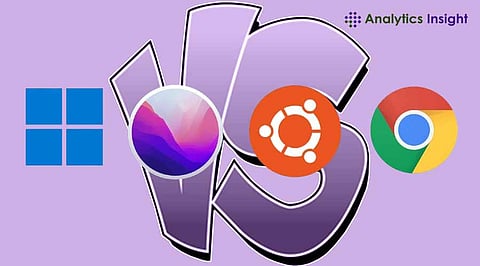

Operating systems manage the web experience, and each operating system is good and bad at something. Windows, macOS, Linux, and ChromeOS are 2025 giants with various demands from gaming and cloud computing.
This bifurcation divides their attributes: performance, user experience, customization, and price; into neat sub-headings. Considering hardware support, software ecosystems, and target markets creates a better picture of which platform can wear the mantle of the best.
Efficiency and speed vary between these systems. Windows supports a staggering range of hardware, from low-cost laptops to PCs for gaming, fully utilizing its enormous driver base.
macOS, which is locked to Apple's high-end hardware, delivers performance through close integration. Testing shows quicker boots and more seamless execution on MacBooks than on similarly specced Windows laptops. However, its inaccessibility cuts off choices, trapping users within expensive ecosystems.
Accessibility of applications creates user experience. Windows boasts the largest library with anything from pro applications like Adobe Creative Suite to unparalleled gaming collections through Steam. Its user-friendly interface is ideal for beginners and professionals alike, though frequent updates at times intrude on workflows.
macOS is built for creatives, with effortless integration with Final Cut Pro and Logic Pro. The sleek, high-end look is appealing to those who care about looks and reliability, with less to adjust than the competition. Software compatibility is behind Windows, especially for expert software.
Thanks to free alternatives such as GIMP and LibreOffice, Linux can survive on open-source software. Although its module-based design is most appropriate for programmers and geeks, a steep learning curve and inconsistent application support hinder its widespread adoption.
ChromeOS depends heavily on Google's office suite: Docs, Drive, and Sheets; flourishing on cloud workflows.
Linux is unmatched in terms of flexibility. Users can alter desktops, personalize kernels, or build bespoke systems from scratch. That freedom is not free, needing technical knowledge, so it represents a haven for enthusiasts. ChromeOS limits options, embracing simplicity and security at the loss of control, an acceptable trade-off for one-off users.
Price does affect adoption. Windows licenses cost between $100 and $200, although many devices come pre-installed with it, blunting the blow.
With the majority of distributions being open-source and free, Linux offers unparalleled value. The cheapest option, in the long run, is hardware, which is priced based on specific specifications and includes everything from repurposed computers to high-end builds. ChromeOS drives affordable Chromebooks, at a minimum price of $200, although being dependent on services such as Google One for storage pushes prices up.
Threat mitigation options abound. Because Windows is so dominant, it is frequently the target of malware. Defender and regular updates protect Windows. MacOS enjoys a walled garden, reducing attack surfaces, despite the growing popularity of the Mac attracting more exploits.
Linux is very secure, with open-source code audited by communities and limited default permissions resisting attacks. Misconfigurations can reveal vulnerabilities, though. ChromeOS takes advantage of sandboxing and automated updates, providing strong security for web-oriented users, albeit with Google's data harvesting raising privacy issues.
Each OS has its own separate constituencies. Windows owns gaming, business, and general-use computing, drawing a wide following. macOS appeals to creatives: designers, video editors, and musicians; focusing on smooth workflows. Linux appeals to developers, server admins, and privacy enthusiasts, excelling in technical niches. ChromeOS is best for students, educators, and everyday users, winning in education and light use.
There isn't a single OS that rules them all. Windows wins at versatility and software depth, macOS wins at polish and creative apps, Linux wins at cost and customization, and ChromeOS wins at ease and cost.
The supreme choice is based on specific needs: gaming favours Windows, design favours macOS, coding favours Linux, and budget browsing raises ChromeOS. In 2025, coexistence trumps supremacy.
